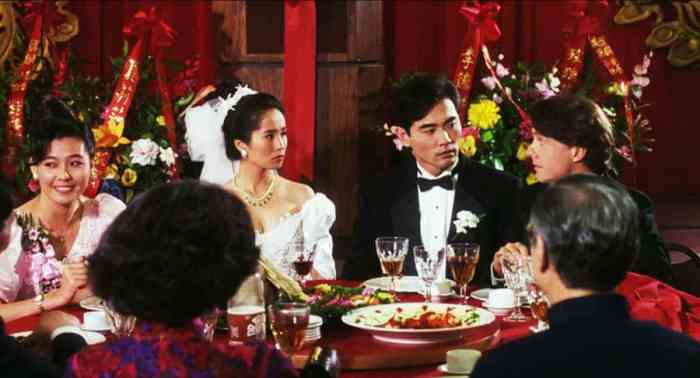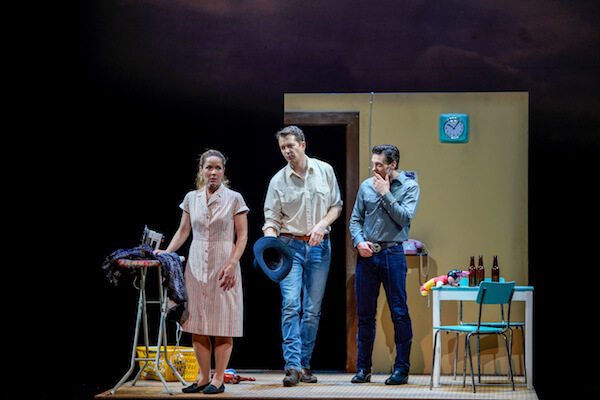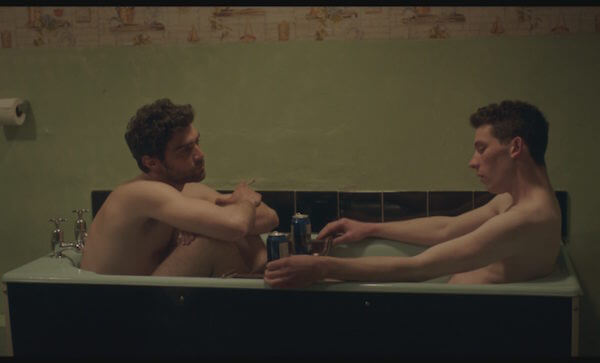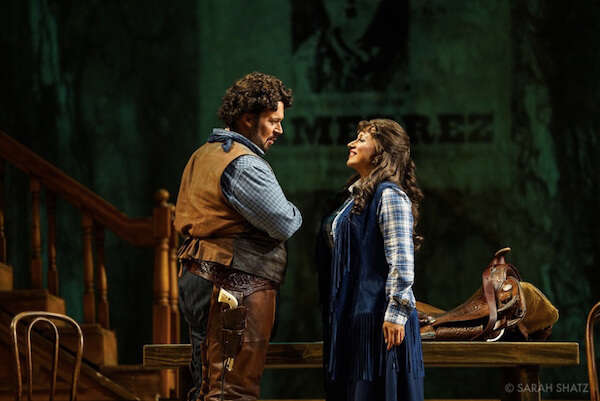Tom Randle and Daniel Okulitch in the 2014 world premiere of Charles Wuorinen’s “Brokeback Mountain,” with a libretto by annie Proulx at the Teatro Real in Madrid. | JAVIER DEL REAL/ TEATRO REAL
Back in 2008, the late impresario Gerard Mortier, then general director designate of the New York City Opera, commissioned from composer Charles Wuorinen an operatic adaptation of Annie Proulx’s 1997 short story “Brokeback Mountain” to be the centerpiece of his inaugural season. Mortier ended up never taking over the opera — due to budget and financing issues — and the project evaporated with the rest of his planned season. Five years later New York City Opera filed for bankruptcy, and Mortier took the project to the Teatro Real in Madrid where it premiered in 2014 in a production by Dutch director Ivo Van Hove.
Annie Proulx adapted her New Yorker short story tracing the forbidden love of two Wyoming cowboys over two decades into an opera libretto. She made some novel departures from both her original New Yorker short story and Larry McMurtry’s screenplay for the award-winning 2005 Ang Lee film adaptation. After a successful runs in Madrid, Aachen, Germany, and the Salzburg State Theater, Wuorinen’s “Brokeback Mountain” opera is coming home to the newly reorganized New York City Opera for its US premiere production.
“Brokeback Mountain” is the second installment in New York City Opera’s annual LGBT Pride Series. There will be four performances, May 31 through June 4, at Jazz at Lincoln Center’s Rose Theater at the Time Warner Center in Columbus Circle.
Charles Wuorinen’s “Brokeback Mountain” comes to Manhattan
The New York City Opera production will be directed by Jacopo Spirei, recreating the more intimate production he directed for the Salzburg State Theater. Kazem Abdullah will lead the New York City Opera Orchestra in a new 26-piece orchestral reduction of the score by the composer. Heading the cast will be two veterans of the original Madrid premiere production: bass-baritone Daniel Okulitch as Ennis del Mar and soprano Heather Buck as his unhappy wife Alma. Joining them as newcomers will be tenor Glenn Seven Allen as Jack Twist and mezzo-soprano Hilary Ginther as his wife Lureen, with Christopher Job, Brian Kontes, and Melissa Parks among the supporting cast.
Gay City News interviewed both male leads, Okulitch and Allen, soprano Buck, conductor Abdullah, and production director Spirei about the challenges of Wuorinen’s craggy, spare 12-tone score as well as the inevitable comparisons with the iconic film version.
Glenn Seven Allen is Jack Twist in the New York City Opera production of “Brokeback Mountain,” directed by Jacopo Spirei. | COURTESY OF NEW YORK CITY OPERA
ELI JACOBSON: How many of you have seen the 2005 Ang Lee film of Annie Proulx’s short story? How influenced were you by the performances in the film or did you choose to approach the opera from a different point of view? What are the differences between the film, the original short story, and Annie Proulx’s libretto for the opera?
DANIEL OKULITCH (ENNIS): I saw the movie in the theater and then watched it again prior to working on the opera, more for idea-mining than for instruction. The opera is very different from the movie and is closer in tone to the short story, which is devoid of sentimentality and is quite bleak. The music reflects this, in its angularity and dissonance. The movie is beautiful in its own right, but is far more romantic, which perhaps was necessary to sell it to a larger audience.
GLENN SEVEN ALLEN (JACK): I saw the film when it first came out and found it devastatingly heartbreaking. I think it’s a very relatable story to anyone who has had unrequited love sometime in their life. Before I met my wife I was a somewhat hopeless romantic young man and definitely went through some pretty brutal heartbreaks.
As far as the difference with the libretto, the film, and the original story, we’re really lucky to have the same writer, Annie Proulx. I think the biggest thing that’s different about the opera is that I feel that the Mountain is really a character in the story, and a very ubiquitous character at that. You can hear its presence in the score throughout the entire opera. It’s first described by the character of Aguirre as a brutal place that kills men. But for Jack and Ennis it becomes a somewhat romantic paradise that they wish they could return to.
HEATHER BUCK (ALMA): Annie Proulx’s short story approaches the action with an incredibly raw economy of word and emotion — I find in it a wonderfully compelling harsh brutality and deep beauty. In her libretto, she continues to pack a lot of meaning into each line — each word is deliberate and important, I’m not sure I could identify one single frivolous line. The film is visually gorgeous and a lyrical version of the story, with such strong performances all around. I actively tried not to refer to my memories of the film so that I could find my own way into Alma’s character and how she interacts with the world around her. I don’t want to deliver Michelle Williams’ interpretation of Alma, even though she gave a spectacular performance. Also, the music itself is a critically important ingredient: Charles Wuorinen has created a sound world of emotional power and dazzling variety, coloring each character, each scene, and each interaction so specifically that it’s really not possible to recycle a previous interpretation satisfyingly into this work.
Dan Okulitch reprises his role as Ennis del Mar.COURTESY OF NEW YORK CITY OPERA
EJ: Daniel and Glenn: both of you are straight in your private lives and in the roles you portray in your operatic repertory. What is it like singing a love scene with another man — is it very different from singing duets with a woman?
DO: Not especially different, though the love duets we have are full of inner conflict and questioning. There isn’t a straight-up love duet where both characters are unabashedly declaring their love, since this isn’t that kind of story or that kind of connection. I’m actually trying to think of the last opera I did where there was a true love duet in the classic sense — maybe parts of “Le Nozze di Figaro?” Bass baritones don’t get a lot of love duets!
GSA: I really don’t perceive any difference in singing a love duet between two men from singing with a woman, other than the fact that Dan is a couple inches taller than me —which is a first for me! I’m a storyteller, and this is the story of two people falling in love, so gender isn’t really something that I’m super concerned about.
EJ: Daniel and Heather: you are coming back to “Brokeback Mountain” after a four-year break. Both of you have worked on several world premieres of contemporary operas. What is it like reviving a work you created in its world premiere but this time in a different production?
HB: It really is an honor to revisit a brand new work, whether in the original or a new production. Pressure is high during the first iteration, and if I’m lucky enough to immerse myself in the music a second time, I get to play with layering new colors and thoughts on my part — with the comfort of approaching it with some degree of familiarity. I find I have more freedom to listen, react, and introduce different flavors into my character.
DO: I find it a lot more relaxed. The first time with a new piece is almost forensic. What do we have? What kind of a piece is it? What are the problem spots, the challenges and unknowns? Can we even do this? Second time around, you have the certainty that you can do it and don’t have to spend time trying solutions that are dead ends. The entire process is streamlined and less stressful.
KAZEM ABDULLAH (CONDUCTOR): It is always great to revisit a work after having done it before. I actually only saw the rehearsals and a performance of the Madrid premiere production. Hearing and seeing the piece with the amazing performances given by Dan and Heather made me want to bring “Brokeback Mountain” the opera to Aachen, Germany, the following year where I was chief conductor at the time.
JACOPO SPIREI (DIRECTOR): Coming back to “Brokeback” after three years is very exciting. Especially since the cast is a mix of people from the three existing productions of the opera, it’s somehow the sum of the best with some new blood added to it. As I’m working on directing the piece, more than recreating the original Salzburg production, I find myself adapting it to the artistry of the new cast.
TOP: ANNA-MARIA LÖFFELBERGER/ BOTTOM: ROBERT TRACHTENBERG
EJ: How has the piece changed for you since 2014? This is a chamber version with a reduced orchestration and a more intimate staging. How is that different for you?
HB: My individual job remains the same — to commit unreservedly to Alma’s character and situations and make her music feel as natural and in-the-moment as possible. It already feels more intimate to me, simply because I already have a history with the music. It’s like returning to a familiar environment.
DO: At this point, I haven’t rehearsed with the orchestra to know how it will be different in texture or feel. The Madrid production was certainly grand in scale, and this already does feel more intimate. The arc of the character remains the same, however, so in that sense the core of it hasn’t changed. What has changed for me in the last few years is just a deeper understanding of what sort of journey Ennis goes on. Life experience and some rumination are some of the great teachers. It’s a privilege to play a character that has meant so much to so many people. It’s added to my understanding of the human experience and I’m grateful.
EJ: In the film and story, Ennis is a very inarticulate character. How did the composer and librettist confront the challenge of making a character who hardly talks into one who sings long arias?
DO: Ennis is a man of few words, but also a person who struggles to express himself at the best of times. He can be explosively angry, but otherwise he bottles up his thoughts and feelings, so the vocal writing reflects this. Short lines, half spoken, dominate the first act, and parts of his conversations with his wife Alma. The connection with Jack is one that brings him a sense of calm, possibly for the first and only time in his life, and it is with Jack that he begins to be vulnerable, which is reflected in his vocal line being more sung and expressive. He doesn’t truly find his voice, an unfiltered line from his voice to his heart, until the very end of the opera, which is the crux of the tragedy
EJ: The political climate has changed in the four years since “Brokeback Mountain” premiered in Madrid. Do you feel this work is more pertinent now as the gay community faces greater challenges especially in places like Wyoming?
DO: I hope for a time when the plot of “Brokeback” seems antiquated, but we’re by no means there yet. We’re seeing some very strong pushback against the progress made in the last 10, 20, 30 years, yet in poll after poll the majority of Americans have become more accepting of LGBTQ citizens and supportive of their rights. What we’re seeing are the most regressive elements having been given power and are actually in no way speaking for the majority. It’s disturbing, and in that sense “Brokeback” does feel pertinent.
The journey for my character is more one of self-discovery and acceptance than it is a political piece, though of course we can’t separate the political from the personal. Ennis cannot accept who he is because of the social constraints he was raised in. However, positive role models for LGBTQ people are far more visible and powerful than in years past, so arguably were this story told today he might not have quite the same agony as he does in the time and place where the story is set. There are options and visibility.”
GSA: I think it’s important that people are allowed to love who they love. I don’t see how a relationship between two people has anything to do with anyone else but them. There’s a level of intolerance that is described and portrayed in this opera about a certain time and certain place in America that unfortunately probably still exists to this very day. And because of this intolerance, both of these men end up broken and alone —– not to mention the fact that they end up unintentionally hurting other people such as their significant others and children.
JS: It’s a love story first and foremost: it is a story of forbidden love or in fact the forbidden love. Set in Wyoming spanning from 1963 to the late 1980s, it tells the story of two men falling in love and not being free to live this love. It’s a story about social boundaries that take over our happiness. It’s an opera that puts us in front of hard choices: Do we choose our beliefs or do we follow our fulfilment as human beings? It’s very interesting to stage an opera on such a subject. As a straight man, I’ve done an amazing journey into the human soul. Everyone loses in this opera: the wives who are only guilty of not being the object of love of the protagonists, the two men whose only fault is not to have the courage to fight social boundaries and prejudices.
“Brokeback Mountain” is an extraordinary challenge: it’s a contemporary opera that with its strength and angularity takes us to the top of a mountain that makes us fall in love and then lets us fall. It takes us from elation to tragedy — the typical elements of Greek tragedy but with deep roots in the contemporary world. Staging and putting on this opera today is crucial. Theater and opera should challenge us, should move us, and ultimately should influence society and the world we live in. I’m extremely honored to have been given a chance to tell this amazing story and with such talented artists.
BROKEBACK MOUNTAIN | New York City Opera | Jazz at Lincoln Center’s Rose Theater, Time Warner Center, Columbus Circle, Broadway at 60th St. | May 31, Jun. 4 at 7:30 p.m.; Jun. 2 at 2 p.m.; Jun 3 at 4 p.m. | $10-$150; nycopera.com/brokeback-mountain or 212-721-6500





































